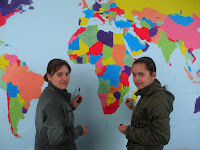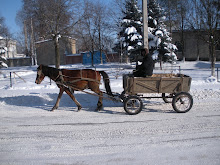 I just got back from a week down south, helping implement a World Map Project. A fellow volunteer started this project just before she needed to leave the country for a family emergency. So while I went down to help her partner (Liliana) finish the project, her whole community essentially adopted me as their own for the week. More times than I can count, people called me by the former volunteer's name rather than my own--a sure sign that she is missed!
I just got back from a week down south, helping implement a World Map Project. A fellow volunteer started this project just before she needed to leave the country for a family emergency. So while I went down to help her partner (Liliana) finish the project, her whole community essentially adopted me as their own for the week. More times than I can count, people called me by the former volunteer's name rather than my own--a sure sign that she is missed!I arrived the Monday following Easter, better known as "a doua zi de pashte" or "the second day of Easter." No one goes to work on the Monday following Easter, it too is considered a holiday. Thus, upon my arrival in the village at 17:00, Liliana and I immediately went to the Baptist Church where her husband (Roma) is the minister.
Ninety-seven percent of Moldovans are Eastern Orthodox. Protestant churches are both rare and grossly misunderstood. Most Moldovans say that the Baptists are not Christians. I've challenged this point a few times, but usually for the sake of not making enemies in my community, I look for an exit from the conversation before my opponent gets too dedicated to the argument.
This was my first time being invited to a Baptist church in Moldova, though I have always wanted to go and see how it compares to the Orthodox services. At the Orthodox services, practically everything the priest says is sung. Words are modified to rhyme and reflect a more perfect meter. Though I tend to understand the meaning of things, never have I understood word for word what was being said as I did at my visit to the Baptist church. What a thrill it was to understand, word for word, the Easter stories in a language as beautiful as Romanian!
And so went my week. Tuesday we went to the forest for a picnic with many of the Baptist ministers from the region, and their families. I understood everything that was said, and unlike the Orthodox Moldovans, who attend to rituals more than anything else, my hosts actually picked up their Bibles and read passages for themselves. I understood the words of the prayers before we took every meal. I understood when the pastors discussed their youth programming, fundraising strategies, and outreach efforts. It was everything you think a church picnic would be, just replace your English with my host country's Romanian.
When I wasn't at the school working on the project, I spent most of my time with Liliana and Roma's family. We visited Roma's village where I met the mayor, Roma's family, and visited the local pasta factory. We watched YouTube videos, ate really quick meals because we were perpetually running late, and drank evening tea. I fell absolutely in love with their two-year old, Diana. Last time I saw her (November 2010) she was so shy she would barely look at me. This week, the case was exactly the opposite, as I started responding to calls for "Tanti Melissa."
Given that Liliana and Roma have a full house, I actually spent my night's at another family's house. A very large house for a very large family. I participated in their second day of Easter feast. Since many people weren't eating meat in the weeks leading up to Easter, I think people are going a little protein crazy these days. On Monday alone I was served the following meats: roasted duck stuffed with fruit chutney, stuffed goose, egg-batter fried chicken, pork stuffed cabbage rolls, and roasted lamb.
My host adamantly insisted that I drink (and like!) his house wine. With only a single ingredient, grapes, he said it's the best juice around and sent me home with a two-liter bottle of his two-year-old white wine on the condition that I tell you all that wine in Moldova is delicious!
Finally, on my last night in the village, I visited my friend's former host family. Luda, the host mother, is particularly upset that her volunteer had to leave so suddenly and misses her very much. We spent the night eating all of that volunteer's favorite foods and recalling stories of her time and work in the village. They hope to have the chance to host another volunteer soon. They wanted to have their picture taken with this teddy bear the volunteer left behind, which the grandson now adores and dresses in his own clothes.
The day I left the village was, again, a family affair. Five adults and two kids total, we squeezed into a sedan that we push started more than once. Took it as far as the district center, where we swapped vehicles with Roma's brother. Taking his van in exchange for the car, we proceeded on to the capital city where Liliana and Roma had errands to run.
A trip to the city is an adventure for the kids, and we didn't part ways until after we celebrated (much to the children's benefit and delight!) the completion of our project over pizza, soda, french fries, and ice cream.


































